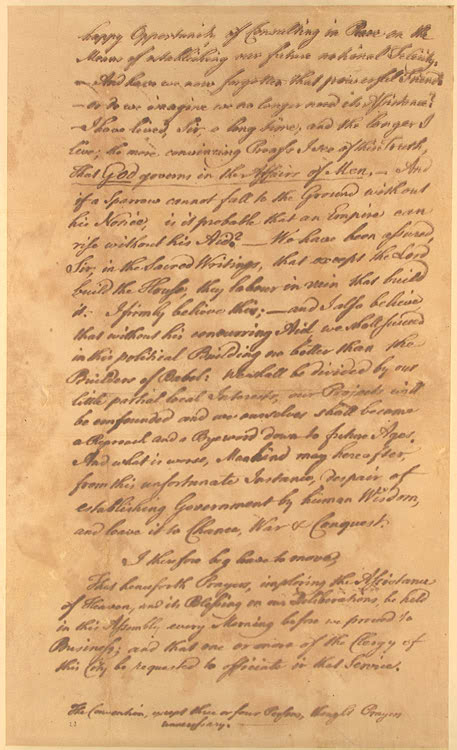All other persons
 The Constitutional Convention took place from May 14th to September 17th, 1787. The delegates spent much of the early month of August adjourned as the Committee of Detail met to refine previously reached agreements, including the contentious role of slavery, before submitting what became an early draft of the U.S. Constitution. Though ten states had already outlawed the slave trade, three key Southern holdouts (Georgia, North Carolina, and South Carolina) threatened to leave the convention and stall progress if the trade were banned outright. Ultimately, delegates instead ratified the Three-Fifths compromise (Article 1, Section 2, Paragraph 3 of the Constitution), which created this federal ratio in order to assess slaves (“all other persons”) as three-fifths of their actual number for purposes of representation in the House and Senate.
The Constitutional Convention took place from May 14th to September 17th, 1787. The delegates spent much of the early month of August adjourned as the Committee of Detail met to refine previously reached agreements, including the contentious role of slavery, before submitting what became an early draft of the U.S. Constitution. Though ten states had already outlawed the slave trade, three key Southern holdouts (Georgia, North Carolina, and South Carolina) threatened to leave the convention and stall progress if the trade were banned outright. Ultimately, delegates instead ratified the Three-Fifths compromise (Article 1, Section 2, Paragraph 3 of the Constitution), which created this federal ratio in order to assess slaves (“all other persons”) as three-fifths of their actual number for purposes of representation in the House and Senate.
In A Slaveholders’ Union: Slavery, Politics, and the Constitution in the Early American Republic, George W. Van Cleve judiciously demonstrates that this Constitution was pro-slavery in its politics, its economics, and its law. Framing the development of a strong federal republic around the allegiance of the Southern states, A Slaveholders’ Union establishes this long-term protection of slavery as the consequence of Southern participation in the fledgling Union.
Pulitzer Prize-winner Annette Gordon-Reed, in assessing the book’s attempt to bring slavery back to the fore of early American political life, commended Van Cleve’s “dazzling addition to scholarship” and noted that no other historian “has made this point so clearly and with so much evidence and strong analysis to back it up.” No faint praise, but just this past month, Library Journal furthered the accolades and named A Slaveholders’ Union one of its top twenty bestsellers this past year in Politics and Law.
For anyone with an interest in the dark past at the foundation of our early American republic or with a passion for the intertwined interests at the core of our constitutional development, A Slaveholders’ Union is one historical analysis not to be missed.
